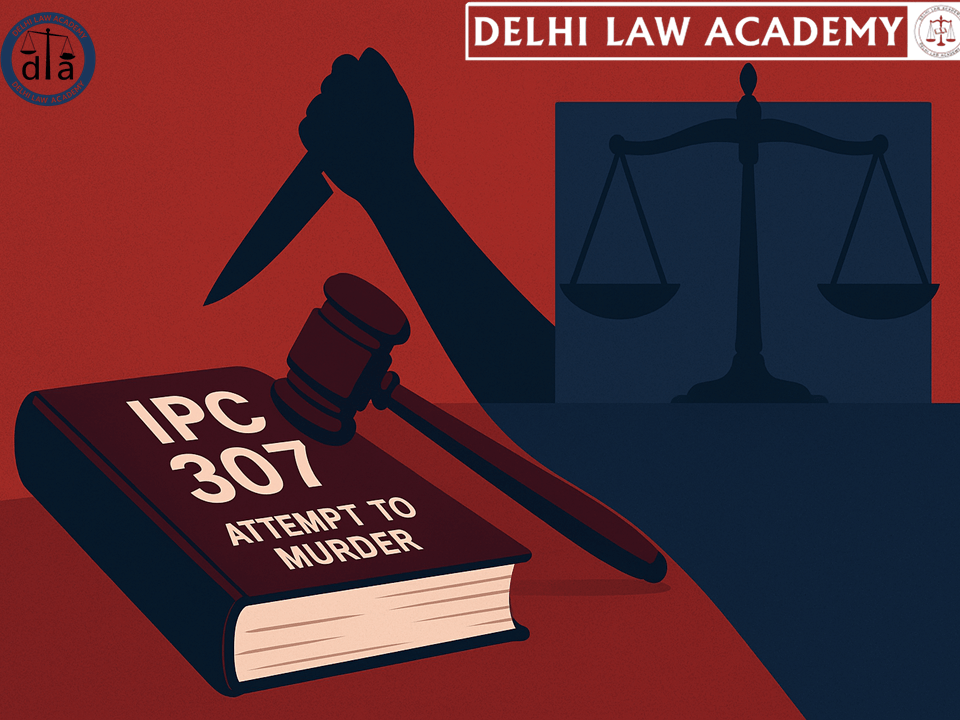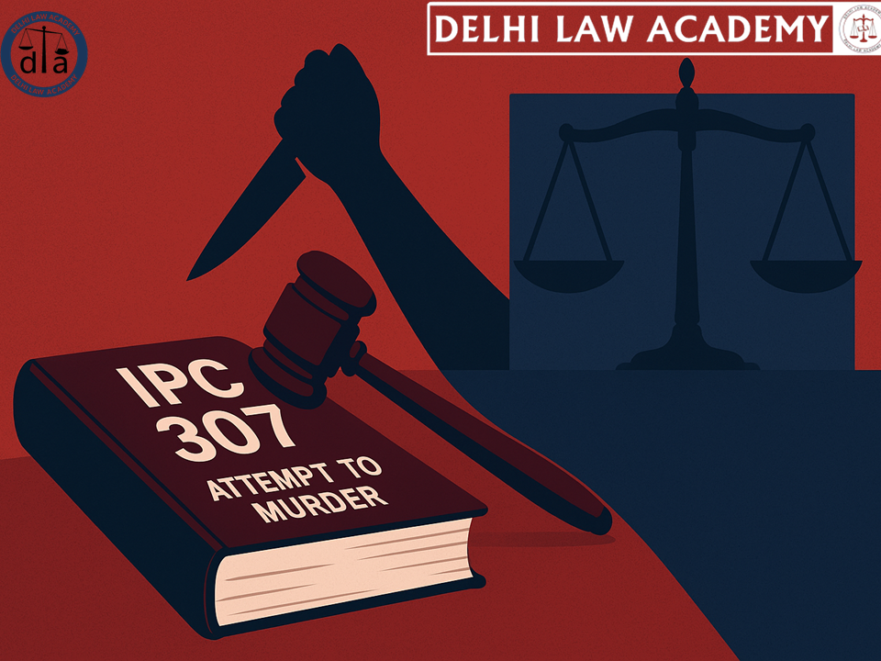
⚖️ Section 307 IPC – Conviction for Attempt to Murder and Extent of Injuries
📌 Topics Covered
- Can there be conviction u/s 307 IPC for attempt to murder in cases of minor injury?
- What is the extent of injuries required for applicability of section 307 IPC?
- Can an accused be convicted for attempt to murder even when the injuries he inflicted on the victim were in the nature of a simple hurt?
Delhi Law Academy Jaipur presents below for aspirants of RJS, DJS, PCS(J) and other Judicial Services throughout India a short Note on the extent of injuries required for conviction u/s 307 IPC for attempt to murder.
🔎 Extent of Injuries Required for Applicability of Section 307
On the question of the extent of injuries required for applicability of section 307, it has been categorically laid down by the Hon’ble Supreme Court in Ratan Singh v. State of M.P. [2009 SC] that for a conviction under section 307 IPC it is not essential that bodily injury capable of causing death should have been inflicted.
📜 Supreme Court in Ratan Singh v. State of M.P. [2009 SC]
“To justify a conviction under this Section, it is not essential that bodily injury capable of causing death should have been inflicted. Although the nature of injury actually caused may often give considerable assistance in coming to a finding as to the intention of the accused, such intention may also be deduced from other circumstances, and may even, in some cases, be ascertained without any reference at all to actual wounds. The Section makes a distinction between an act of the accused and its result, if any. Such an act may not be attended by any result so far as the person assaulted is concerned, but still there may be cases in which the culprit would be liable under this Section.
It is not necessary that the injury actually caused to the victim of the assault should be sufficient under ordinary circumstances to cause the death of the person assaulted. What the Court has to see is whether the act, irrespective of its result, was done with the intention or knowledge and under circumstances mentioned in the Section. An attempt in order to be criminal need not be the penultimate act. It is sufficient in law, if there is present an intent coupled with some overt act in execution thereof.”
“Whether there was intention to kill or knowledge that death will be caused is a question of fact and would depend on the facts of a given case. The circumstances that the injury inflicted by the accused was simple or minor will not by itself rule out application of Section 307 IPC. The determinative question is intention or knowledge, as the case may be, and not nature of the injury.”
✅ Therefore, an accused charged under Section 307 IPC cannot be acquitted merely because the injuries inflicted on the victim were in the nature of a simple hurt.
📚 Sarju Prasad v. State of Bihar (AIR 1965 SC 843)
It was observed by the Hon’ble Supreme Court in para 6 that the mere fact that the injury actually inflicted by the accused did not cut any vital organ of the victim, is not by itself sufficient to take the act out of the purview of Section 307.
📚 R. Parkash v. State of Karnataka (JT 2004 (2) SC 348)
“It is sufficient to justify a conviction under Section 307 if there is present an intent coupled with some overt act in execution thereof. It is not essential that bodily injury capable of causing death should have been inflicted. Although the nature of injury actually caused may often give considerable assistance in coming to a finding as to the intention of the accused, such intention may also be deduced from other circumstances, and may even, in some cases, be ascertained without any reference at all to actual wounds. The Sections makes a distinction between the act of the accused and its result, if any. The Court has to see whether the act, irrespective of its result, was done with the intention or knowledge and under circumstances mentioned in the Section. Therefore, it is not correct to acquit an accused of the charge under Section 307 IPC merely because the injuries inflicted on the victim were in the nature of a simple hurt.”
❓ Frequently Asked Questions on Section 307 IPC
✅ Yes. The Supreme Court has held that conviction under Section 307 IPC is possible even if the injuries inflicted are minor. What matters is the intention or knowledge of the accused, not just the severity of the injuries.
❌ No. In Ratan Singh v. State of M.P. (2009), the Court clarified that it is not essential that the injury should be capable of causing death. The act, coupled with intent or knowledge, is enough for conviction.
⚖️ The Court stated that conviction under Section 307 IPC does not depend solely on the injury inflicted. Even if no fatal injury is caused, an attempt to murder can still be established if there is intent and an overt act by the accused.
🚫 No. The Supreme Court in R. Parkash v. State of Karnataka (2004) held that an accused cannot be acquitted merely because the injury was simple. The decisive factor is the intention to kill or knowledge of likely death.
📖 In Sarju Prasad v. State of Bihar (1965), the Court ruled that the fact that no vital organ was injured does not exclude Section 307. The focus remains on the accused’s intent and not on the specific injury caused.
🔑 The test is whether the act was done with the intention or knowledge of causing death, irrespective of the result. The overt act plus intent is sufficient; the actual injury is secondary.
📚 Further Reading for Law Aspirants
Explore more useful resources from Delhi Law Academy to strengthen your preparation:
Contact us
📍 Delhi Law Academy – Jaipur Branch
6C, Tower 2, Coaching Hub, Pratap Nagar, Jaipur – 302033
📞 Phone:
+91 9911916552
+91 8447285606
✉️ Email:
contactus@delhilawacademy.com

